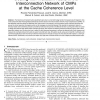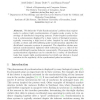716 search results - page 8 / 144 » Tolerating Faults in Synchronization Networks |
ICDCN
2010
Springer
14 years 3 months ago
2010
Springer
Pease et al. introduced the problem of Byzantine Generals (BGP) to study the effects of Byzantine faults in distributed protocols for reliable broadcast. It is well known that BG...
TPDS
2010
13 years 3 months ago
2010
The importance of transient faults is predicted to grow due to current technology trends of increased scale of integration. One of the components that will be significantly affecte...
FORMATS
2004
Springer
14 years 5 days ago
2004
Springer
Davies and Wakerly show that Byzantine fault tolerance can be achieved by a cascade of broadcasts and middle value select functions. We present an extension of the Davies and Waker...
CORR
2008
Springer
13 years 8 months ago
2008
Springer
We define the "Pulse Synchronization" problem that requires nodes to achieve tight synchronization of regular pulse events, in the settings of distributed computing syste...
ICONIP
2008
13 years 10 months ago
2008
Abstract. While injecting fault during training has long been demonstrated as an effective method to improve fault tolerance of a neural network, not much theoretical work has been...


